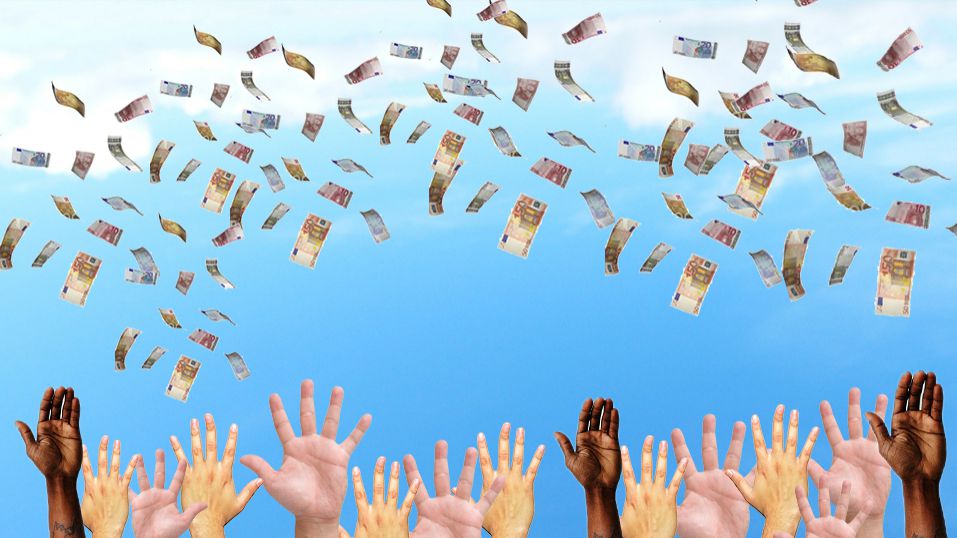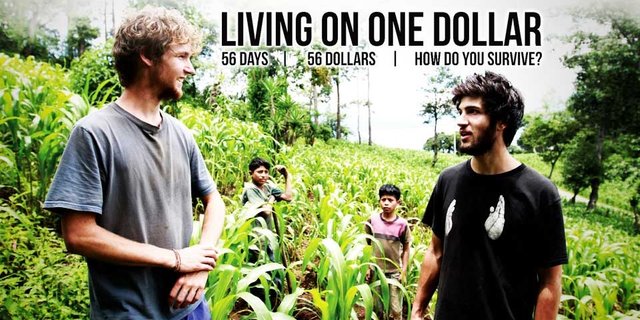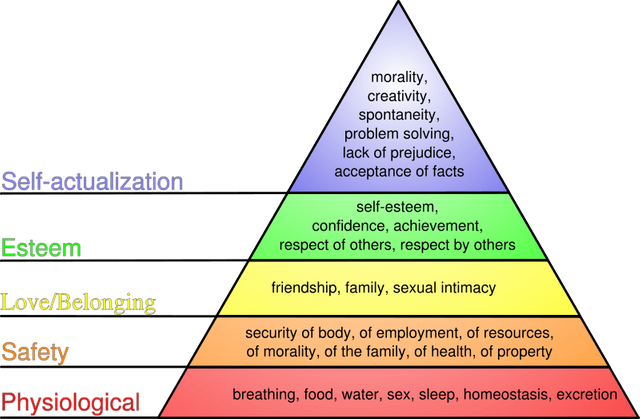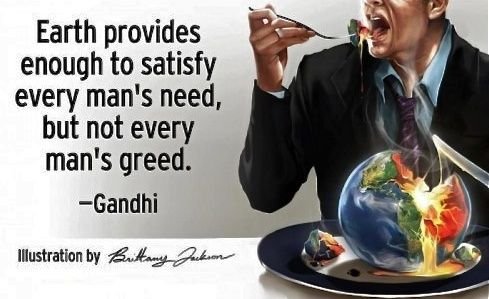An Unconditional Basic Income For Everyone

After the industrial revolution, human society managed to reach enormous sums in the productions of various products. This is very due to the introduction of various types of machines / machinery in the productive sector. These devices managed to multiply the production in relation to the number of people working. If before a seamstress produced a number of textile pieces, now a seamstress or a supervisor, she could take care of some machines, each of which already produced more in relation to a seamstress. I think this is all obvious, but we must remember not only how much our absolute output has increased, but also how it has increased in proportion to the number of people who work.
Let's take a relatively common example: food production. Does the world produce enough food to feed all its inhabitants? Here are some data and view about this subject:
Food: how much does the world need?
Adopting a Territorial Approach to Food Security and Nutrition Policy
As can be seen from these data, the world produces much food, enough to feed even a much larger number of Earth's inhabitants. But the problem is distribution and waste: all this food does not reach people. I consider this an intrinsic defect in the food production and distribution system itself. What if this system could be altered in such a way that all this food produced was not wasted? What if we could make everyone have at least a guaranteed basic food? Taking into account the production we already have, this would not be impossible:
Here we come to the central theme of this text: The Unconditional Basic Income. The number of people who sense that we live in a world of artificially manufactured scarcity has been growing a lot in recent years. At the same time these people also intuit and can visualize a world where abundance can be the pillar of society. This is due to the same thinking we did up there on food, only applied to all other sectors of production of society. It is that perception that we have the capacity to produce more than enough for everyone, and with it we end up with global misery and poverty.
Some interesting statistics about this:
Just 10 percent of world military spending could knock off poverty: think tank
Billionaires Earned Enough Money in 2017 to End Extreme Poverty Seven Times Over, Report Says
To End Extreme Poverty, Let’s Try Ending Extreme Wealth
What needs to be changed is the distribution of resources relative to the number of inhabitants. Minimal and maximum limits need to be considered. And as the situation is much more critical and urgent for those who do not have enough, the minimum threshold is the first that needs to be addressed. How about a minimum income, as a right to all, that can meet all the basic needs of people? This is not at all fantastic, in fact, many constitutions of the world already say that citizens have the right to water, food, education, shelter and work.
Perhaps the realization that this minimum threshold needs to be implemented as a right has not yet reached the required critical mass. If this is the case, let's go deeper into this reflection:
Many people think that they need education before they can get a job, and then they produce to be able to stand on their own. The idea that one's poverty is "deserved" and is a natural effect of that person's inability / idleness is a very strong and widespread prejudice in common sense. But is it really true?
I think this view above is very wrong. And the reason for this misconception is simply not to consider the natural order of life: when we are born, we need a very favorable environment around us to survive. A baby (or even a child) would never be able to survive without a favorable environment around it. In this early moment of life, we are like a sponge: we absorb so much of our environment around us, and we are very dependent on the favorable environment to maintain ourselves, to develop and to grow. And once we have reached a certain maturity, then we gradually develop, each in its own way and in its rhythm, the ability to walk with its own feet, and to sustain itself, with more and more independence from the external environment.
We can generalize this pattern to many other things, for example when we plant a seed and expect it to germinate and become a seedling first, and then a mature plant or tree, that same pattern of development and independence is perceived: the plant needs much more careful in the early stages, and gains more strength and independence later.
And how is the case of the human being when it enters the society? Does our social life also have a similar pattern of development? What would come before? Do we need before a favorable environment or should we expect each one to be able to support itself firstly?
If you have Netflix, here's an excellent tip for reflection on this subject while watching this intriguing documentary:

https://www.netflix.com/title/80026944
In it, four American friends travel to Guatemala with the goal of experiencing extreme poverty living on a dollar a day for two months. Here is a practical, filmed experiment of what happens when people do not have at least a minimal basic resource to develop properly.
In addition, it is very important to note that there are numerous studies and scholars who have come to this same vision. Perhaps the most notorious and known in this particular subject is the psychologist Abraham Maslow with his famous Hierarchy of Needs.
Maslow's hierarchy of needs pyramid:

What this hierarchy of Maslow's needs says, briefly, is that we need to satisfy these needs by starting at the bottom of the pyramid, and when we do this, we go up one step.
In terms of consciousness, this is quite logical, natural, and understandable: we must first guarantee the survival of life at the basic and physiological level (food, water, etc ...) so that we can then take care of other things.
In this sense, an Unconditional Basic Income would have the function of satisfying the first two steps of the pyramid, moving the focus of people's consciousness to the higher steps.
Something very similar is shown here, regarding the Evolution of Desires according to the Kabbalah:
And how do we proceed to sustain this Basic Income for all? Surely we already have the resources, just as we already have food production to satisfy the hunger of everyone on the planet. Here's another sentence that corroborates this:

To end our references to this subject with a golden key, here are two very important videos about Unconditional Basic Income, which talk a little about everything regarding this concept: its history, its origin, studies, reasons why we should adopt such an idea and more:
Rutger Bregman: Why we should give everyone a basic income:
Poverty isn't a lack of character; it's a lack of cash:
Personal Conclusion:
I think that the regulation of a Basic Income for all as a right can be a very effective way to eradicate the misery of the world, and to provide for all the people of the Earth, who are possibilities for flourishing and developing the full diversity of the human potential, the minimum requirements for them to develop satisfactorily. Think of how many wonderful life possibilities may be being stifled in today's world: how many Teslas, Jungs, Mozarts, Einsteins, etc ... may be failing to develop completely because of the lack of a satisfying external environment, which at least provides the basics for life chances develop at least on an acceptable average.
Moreover, the world is now converging to another reality that is provoking more and more the debate around this subject: the great rise of technology in the means of production and several other jobs. It appears that robots, 3D printers and other artificial intelligence softwares can wipe out the vast majority of the world's jobs. And they can do this much more efficiently. What would left for man to do?
We will certainly have to revise all this, especially the relationship between employment and wages. And the idea of Unconditional Basic Income comes out firmly in this context.
Well, I hope I have provided some "food for thought."
Gratitude to all who read this text and could reflect on all this.
This is our goal and why we started the Manna token.
We aim to eliminate or at least reduce global poverty.
All I can reply is: a big THANK YOU to everyone involved in that project. I came in since was called Grant Coin. Couldnt do less since I am a very enthusiast of the UBI proposal. Cheers!
I'm glad to see more and more people putting Maslow and basic income together.
“A basic guaranteed income in the context of Maslow’s Hierarchy of Needs” @ScottCDunn https://medium.com/basic-income/a-basic-guaranteed-income-in-the-context-of-maslow-s-hierarchy-of-needs-c0835b6b8900
On labor day the German unions spoke against an UBI with rediculous arguments (my German rant).
It would out people on the storage track (right word?), people would sit unhappy at home, and most fearsome: Work and money would be decoupled!
Imagine that, people would maybe work without getting paid by someone else! JUST BECAUSE THEY LIKE IT!!!
Imagine people could create beauty instead of destroying the earth to earn a living!
Imagine they would have time to care for their elders!
Imagine people would do what they think has a meaning! (On this my post of yesterday: https://steemit.com/life/@lennstar/ever-been-in-a-bullshit-job )
It is easy to see that the unions fear that they will vanish if people are able to just walk away from a workplace that does not pay them fair or where they are seen as slaves.
how can UBI be provided without resorting to theft?
See the Trans-Alaskan Pipeline.
nah...you mean Alaska Permanent Fund
I give you an easy question and you miss it...
Shame.
How else?
Exactly what did I miss? I answered your question with an example you posted the wiki to, a question you seem to have known the answer to, which begs the question, why did you even ask your question if you knew good an well exactly how a UBI can be funded? What, that's not good enough for you? Let me ask you plainly before I waste my to giving MORE references to your imbecilic insinuating contention that UBI is funded through THEFT, have you exhausted your research in exactly how ubi could be funded and is this then a semantic argument where taxes or duties incurred for using privileges is Theft?
Yes, for everitt giving something back to the society you live in based on a rule the society gave itself is theft.
It makes neither legal nor moral sense, but that is how religious believers live.
It's either Theft or it's not, and the benefits from the transalaskan pipeline aren't Theft, so why is it Theft?
No moral sense or legal sense?
In a moral sense the genius unmatched of Benjamin Franklin said
In a legal sense and a lawful, common sense, sense Taxes are the burden you voluntarily chose to bear for the benefits. In other terms, the Legal Maxims:
https://ecclesia.org/truth/maxims.html
What benefits? The benefits of citizenship, this why it's private law, you work for the state by dawning the title citizen. As your employer they have every right to tell you how to wipe the floor, the privileges of citizenship Cary their own disadvantages.
how can education be provided without resorting to theft
how can healthcare be provided without resorting to theft
how can any social service be provided without resorting to theft.
The argument you want to make is that UBI is provided by theft, but instead, you phrase it as a question, as if it simply never clarified how it can be achieved without theft, good one, that's why you have plenty of example above to rub those two nerve cells together.